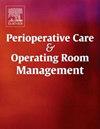An audit of theatre operating efficiency at a central hospital in South Africa
IF 1
Q2 Nursing
Perioperative Care and Operating Room Management
Pub Date : 2025-06-10
DOI:10.1016/j.pcorm.2025.100506
引用次数: 0
Abstract
Background
The South African health system functions within a resource-constraint environment. By improving the efficiency of theatre services, costs can be reduced alongside improvement in service delivery. This study aimed to assess theatre operating efficiency at a central hospital in Gauteng Province, South Africa.
Objectives
To assess theatre efficiency by determining the theatre utilization rate, theatre cancellation rate, and determining the causes of inefficiency.
Methods
An audit was conducted from 15 May 2023 to 19 May 2023, between the hours of 08h00 and 16h00, in 7 operating rooms. The 5-day audit was conducted to capture a snapshot of theatre efficiency to inform operational management decision making. Times were collected for each surgical case including the anaesthesia start and finish time, surgical start and finish time, and turnover time. Cancellations of cases were documented with reasons, additional delays observed were recorded.
Results
A total of 16 320 min were available for utilization for elective and emergency cases. A total of 63 elective and 6 emergency cases were performed. The theatre utilization rate accounted for 67,7 % (11 047 min) of block time. Surgical time was 40 % of the block time. Non-surgical time accounted for 60 % and included anaesthetic time (25 %), time lost due to early finish (10 %), turnover time (3 %), time lost due to late starts (4 %) and post-surgical time (3 %). The day of surgery cancellation rate was 39 %, with 40 elective cases cancelled of 103 elective cases booked. Hospital-related factors accounted for 90 % of all cases and 10 % were secondary to patient-related factors, illustrating a greater need to address hospital related factors to reduce day of surgery cancellations.
Conclusions
The theatre utilization rate did not meet standards reflected in literature. The day-of-surgery cancellation rates were higher than what is recommended. Causes of inefficiency need to be addressed to optimize theatre functions.
Recommendations
Key strategies include realistic scheduling of elective theatre cases, maximizing theatre availability, implementing staff rotations, enhancing professional communication and performing continuous theatre audits. These interventions aim to improve theatre utilization and reduce day of surgery cancellations, which will ultimately enhance patient outcomes.
对南非一家中心医院手术室运营效率的审计
背景:南非卫生系统在资源有限的环境中运作。通过提高剧院服务的效率,可以在改善服务提供的同时降低成本。本研究旨在评估南非豪登省一家中心医院的手术室运营效率。目的通过确定剧院利用率、剧院取消率和确定低效率的原因来评估剧院效率。方法于2023年5月15日至2023年5月19日08:00 - 16:00对7间手术室进行审计。为期5天的审计是为了捕捉剧院效率的快照,以便为运营管理决策提供信息。收集每个手术病例的麻醉开始和结束时间、手术开始和结束时间、周转时间。取消案件的记录有理由,观察到的额外延误也有记录。结果选择性和急症患者共使用了16 320分钟。共63例择期手术和6例急诊手术。院线使用率为67.7% (11,047 min)。手术时间占阻滞时间的40%。非手术时间占60%,包括麻醉时间(25%)、提前结束时间(10%)、周转时间(3%)、延迟开始时间(4%)和术后时间(3%)。当日手术取消率39%,预约手术103例,择期手术取消40例。医院相关因素占所有病例的90%,10%是继发于患者相关因素,说明更需要解决医院相关因素以减少手术取消。结论剧院使用率未达到文献所反映的标准。手术当天的取消率比推荐的要高。效率低下的原因需要解决,以优化剧院功能。建议关键策略包括切合实际地安排可选剧院病例、最大限度地利用剧院、实施工作人员轮岗、加强专业沟通和持续进行剧院审计。这些干预措施旨在提高手术室的利用率,减少手术取消的时间,最终提高患者的治疗效果。
本文章由计算机程序翻译,如有差异,请以英文原文为准。
求助全文
约1分钟内获得全文
求助全文
来源期刊

Perioperative Care and Operating Room Management
Nursing-Medical and Surgical Nursing
CiteScore
1.30
自引率
0.00%
发文量
52
审稿时长
56 days
期刊介绍:
The objective of this new online journal is to serve as a multidisciplinary, peer-reviewed source of information related to the administrative, economic, operational, safety, and quality aspects of the ambulatory and in-patient operating room and interventional procedural processes. The journal will provide high-quality information and research findings on operational and system-based approaches to ensure safe, coordinated, and high-value periprocedural care. With the current focus on value in health care it is essential that there is a venue for researchers to publish articles on quality improvement process initiatives, process flow modeling, information management, efficient design, cost improvement, use of novel technologies, and management.
 求助内容:
求助内容: 应助结果提醒方式:
应助结果提醒方式:


